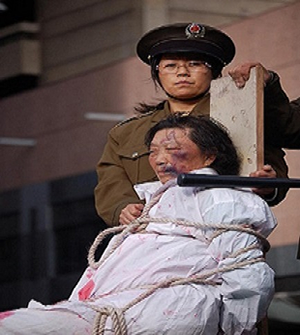Chinese Internment Camps’ Brutality and Abuse Ignored by Democrats and News Media
 “On February 19, 1942, shortly after the bombing of Pearl Harbor by Japanese forces, the Democratic Party’s favorite President Franklin D. Roosevelt signed Executive Order 9066 with the intention of preventing espionage on American shores.
“On February 19, 1942, shortly after the bombing of Pearl Harbor by Japanese forces, the Democratic Party’s favorite President Franklin D. Roosevelt signed Executive Order 9066 with the intention of preventing espionage on American shores.
“Military zones were created in California, Washington and Oregon — states with large Japanese American populations — and Roosevelt’s executive order commanded the relocation of Americans of Japanese descent.
“The Democrat Commander in Chief’s Executive Order 9066 affected the lives about 117,000 people—the vast majority of whom were either born or naturalized American citizens.
“Canada soon followed suit, relocating 21,000 of its Japanese residents from its west coast. Mexico enacted its own version, and eventually 2,264 more people of Japanese descent were removed from Peru, Brazil, Chile and Argentina to the United States.” — Det. Sgt. Jacob “Jake” Hammerman (Ret.)

On Wednesday, U.S. Customs and Border Protection (CBP) officers at the Port of New York/New Jersey intercepted a suspicious shipment of products/accessories which proved to be made with human hair. The products allegedly originated in Xinjiang, China, and pointed to alleged human rights violations of forced labor performed by imprisoned children. The products commandeered by the Department of Homeland Security’s CBP were part of shipment of almost 13 tons of hair products worth over $800,000 dollars that arrived in the United States.

“CBP detained the shipment in accordance with a Withhold Release Order (WRO) on hair products manufactured by Lop County Meixin Hair Product Co. Ltd. On June 17, CBP instructed ports of entry nationwide to detain all such products based on information that reasonably indicated that they are manufactured with the use of prison labor. The manufacturing process may include additional situations of forced labor, including, but not limited to, excessive overtime, withholding of wages, and the restriction of movement. The WRO provides the importer of record the opportunity to export the shipment or to demonstrate that the merchandise was not produced with forced labor,” according to a government report emailed to the National Association of Chiefs of Police, a fraternal organization of top cops, sheriffs. and security directors from major government and private-sector departments.
“It is absolutely essential that American importers ensure that the integrity of their supply chain meets the humane and ethical standards expected by the American government and by American consumers,” said Brenda Smith, Executive Assistant Commissioner of the CBP Office of Trade. “The production of these goods constitutes a very serious human rights violation, and the detention order is intended to send a clear and direct message to all entities seeking to do business with the United States that illicit and inhumane practices will not be tolerated in U.S. supply chains,” said Commissioner Smith.
The federal statute — 19 U.S.C. 1307 — prohibits the importation of merchandise mined, manufactured, or produced, wholly or in part, by forced labor, including convict labor, forced child labor, and indentured labor. The current detention underlines the importance and effectiveness of WRO implementation in ensuring that the goods entering U.S. commerce meet the requirements set forth by this statute.
19 U.S. Code § 1307.Convict-made goods; importation prohibited
- All goods, wares, articles, and merchandise mined, produced, or manufactured wholly or in part in any foreign country by convict labor or/and forced labor or/and indentured labor under penal sanctions shall not be entitled to entry at any of the ports of the United States, and the importation thereof is hereby prohibited, and the Secretary of the Treasury is authorized and directed to prescribe such regulations as may be necessary for the enforcement of this provision.
- “Forced labor”, as herein used, shall mean all work or service which is exacted from any person under the menace of any penalty for its nonperformance and for which the worker does not offer himself voluntarily. For purposes of this section, the term “forced labor or/and indentured labor” includes forced or indentured child labor.

The importation of goods produced with forced labor threatens the reliability of the U.S. supply chain and introduces unfair competition into the global market, which can negatively affect the competitiveness and integrity of American businesses. It is the responsibility of all U.S. importers to confirm their supply chains are free of forced labor in order to ensure the origin and quality of goods consumed by the American public align with the laws and principles established by the United States Government and to protect the American economy.
All WROs are publically available and listed by country on CBP’s Forced Labor Withhold Release Orders and Findings webpage. The Forced Labor Division (FLD), established in 2017 within CBP’s Office of Trade, leads the enforcement of the prohibition on the importation of goods made from forced labor by those sentenced to internment camps run by the world’s dictatorships
The Chinese communist government — with its history of running death and internment camps — has achieved the approval of several international groups such as the World Health Organization (WHO) and the support of the United States’ Democratic Party and some anti-Trump Republicans. “Let’s not forget that the Democratic leadership during World War II supported President Roosevelt’s actions when he ordered Japanese American citizens to be rousted and herded into internment camps,” said criminal justice historian Linda Reyes-Siegal. Professor Reyes-Siegal has often noted that while the Democratic Party possesses a checkered past — including slavery, rebellion, creation of the Ku Klux Klan, installing Jim Crowe laws, opposing civil rights legislation, and perpetrating mass killings such as the Branch Davidian slaughter of more than 80 men, women and children by the Clinton administration in Waco, Texas.
CBP Office of Field Operations (OFO) and the ports of entry throughout the country represent the agency’s front line in intercepting illicit trade. Within CBP, the Office of Trade conducts investigations into allegations of forced labor and if substantiated, directs the associated enforcement actions. Every day CBP interdicts shipments containing goods that are unlawfully produced using forced labor or that violate laws related to safety or intellectual property rights.
https://youtu.be/qk0-pLZh8mM


